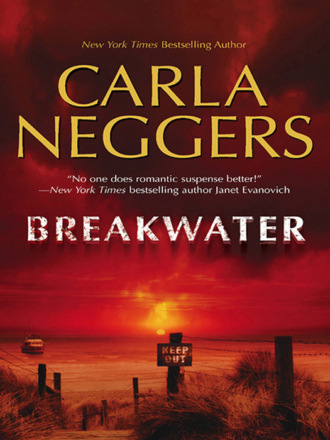
Полная версия
Breakwater
There were no giant trophy houses in Yorkville. Most of the houses—year-round or second home—were built in the 1940s and 1950s. If he ran the town for a day, Huck would outlaw chain-link fences. It seemed every house had one, and he thought they were damn ugly, the only real blot on the otherwise quaint town.
The cottage where Alicia Miller had spent the weekend was the second of two small, older cottages on the dead-end road. It had no fence. Its ground-level front porch was low enough not to need a balustrade, allowing an unimpeded view of the water from its clean white wicker chairs.
Huck had noticed there was no car in the short dirt driveway. Nor was there any sign of life inside, although he hadn’t gone so far as to knock on the front or side doors or peek in the windows.
He finished his stretches. He could have skipped them, but they gave him an excuse to check out the area. The road dead-ended at a salt marsh. On the other side of the marsh, about three-quarters of a mile farther up the bay, was Breakwater, known locally as the Crawford compound, the hundred-acre waterfront estate owned by wealthy Washington entrepreneur Oliver Crawford. Crawford had made his fortune in real estate and bought Breakwater five years ago. Most locals expected him to renovate the pre-Civil War house and retire there.
They were wrong. Crawford changed his plans for his bayside property after he was kidnapped off his boat in the Caribbean last December. His own security people rescued him after fifteen days of captivity. He was kept under grueling conditions and constant fear of a bullet in the head. His kidnappers got away. Traumatized, determined to help other businessmen avoid such horrors, Crawford decided to start his own elite private security company. Never mind that he knew little to nothing about the private security industry. He set about converting his bayside country estate into Breakwater Security, bringing in the people and equipment he needed, building the right facilities, sparing no expense.
Huck was a new Breakwater Security hire.
Ostensibly.
As he looked out at the water, he decided he could do worse than Virginia in springtime. He noticed that some kind of bird had built a giant mess of a nest on a buoy out at the mouth of the small cove. An osprey nest, he thought. The Northern Neck, a tidewater peninsula tucked between the Potomac and the Rappahannock Rivers, was on the Atlantic Flyway, making it popular with bird-watchers.
A Californian, Huck was getting used to the lay of the gentle land with its rolling hills, creeks, marshes, nature preserves, historic sites and small towns. Washington and Lee country. Life was slower here. He could picture George Washington and Robert E. Lee as little boys, fishing the same rivers, praying in the same churches that were still scattered across the landscape.
Or not—Huck didn’t know what Washington and Lee did as boys or if the places he’d seen on his way to Yorkville had existed in their day. History had never been his long suit.
He was better at catching fugitives.
It was, after all, a fugitive who had inadvertently led him to the Northern Neck in the first place.
But he shut off that line of thinking, as if it might betray him, and jogged back down to the loop road, passing the second cottage, a sister to the one where Alicia Miller had stayed. He kept his pace slow, following the wider, but still quiet, road along the water, feeling the humidity building in the midafternoon air.
He came to a small, old-fashioned motel with its own dock. A couple of old guys in baseball caps smoked cigarettes on two benches above the water, watching fishing boats tie up for the day.
At first, even Huck didn’t recognized Diego Clemente, his partner and backup, also an undercover deputy U.S. marshal. Clemente—also a Californian—looked as if he’d been fishing the Chesapeake Bay his entire life. He hopped off his boat onto the rickety dock wearing a New York Yankees cap, a bright yellow anorak, cargo pants and beat-up boat shoes. His brown skin and black hair set off a killer smile and killer eyes. Women liked Diego, but he and Huck had both sworn off women until they were back home, their current assignment behind them.
Breakwater Security wasn’t necessarily the legitimate security company it purported to be. Diego was posing as a guy from up North who’d taken a month off to fish and get over his recent divorce, a cover designed to explain why he kept to himself. Not that there was a hell of a lot to do in Yorkville, Virginia.
Locked in Diego’s boat, Huck knew, were state-of-the-art communications equipment, tactical gear and weapons, including, no doubt, Clemente’s favorite MP5. If things went bad at Breakwater Security, Huck knew he could count on Diego Clemente to help him kick ass and stay alive.
Huck pretended to pause to catch his breath, although it would take more than a five-mile run to really wind him. He worked his butt off on a regular basis to stay in shape.
Standing next to him, Diego tapped out a cigarette, then held up the pack to Huck. Huck shook his head. “Smoking’ll kill you.”
“So will women, and still the knowledge of my impending doom doesn’t stop me,” Diego replied.
In his regular life, Diego didn’t smoke. He was a nuts-and-seeds type. He pulled a small lighter from his pocket. “Storm’s brewing. You can feel it in the air, can’t you?”
“It’s East Coast air. I can’t tell.”
Diego lit his cigarette and inhaled, blowing out smoke. “I talked to Nate Winter.” Winter was leading the investigation into Breakwater Security’s activities. “I don’t have many answers for you. Alicia Miller is an attorney at Justice. She works under Deputy Assistant AG Lattimore.”
“Gerard Lattimore? Hell, Diego, he and Crawford—”
“Friends since they were roommates at Princeton twenty years ago.”
“The cottage?”
“It’s owned by a woman named Quinn Harlowe. Expert in transnational crime. She worked under Lattimore until January. Now she’s consulting. I heard she’s teaching a class or something at the FBI Academy.” Diego pointed toward the water, as if they were discussing fishing. “She helped get Alicia Miller her job at Justice.”
“So they were friends before they worked together. Any word on Miller?”
Diego didn’t answer.
That meant no.
Alicia Miller had turned up at Breakwater early that morning—just past dawn—and yelled incoherently at the front gate. A couple of Crawford’s existing security guys took her back to her cottage. They told Huck, who never saw Alicia, the basics—her name, that she’d spent the weekend in the cottage across the marsh and didn’t approve of Oliver Crawford turning his estate into a new private security firm.
Follow-up questions weren’t invited. Since he had a role to play, Huck shrugged off the incident and spent the morning settling in at Breakwater. At lunch, he took off for the village and found Clemente. They relied on face-to-face communication. It had its risks, but given the technical expertise of the people they were investigating, Huck and Diego both agreed—and got their superiors to agree—that primitive communication methods were safest.
Like Huck, Diego didn’t believe Alicia Miller had shown up at Breakwater at dawn just to make a protest, either. He promised to find out what he could about her. Huck had returned to Breakwater. Now, he was back, talking to Diego for a second time—a risk, but a necessary one.
“The Breakwater guys said Miller calmed down and went back to D.C.,” Huck said.
Diego took a token drag on his cigarette. “Maybe.” He tossed the cigarette onto the pavement, grinding it out under one foot. “She doesn’t fit the profile of the typical crack-of-dawn protester. How incoherent was she?”
“I don’t know. Nobody’s saying. What about her boss, Lattimore? What does he know about our investigation?”
“Nothing. He’s out of the loop. Nobody knows about you who didn’t know before this morning. You’re not compromised. Whatever Alicia Miller was up to at Breakwater—we’ll find out.” Diego cracked a small smile. “Maybe she was protesting.”
Not exactly reassured, Huck left Diego to his fisherman’s life and resumed his slow jog around Yorkville.
Very few people were aware of the existence of the task force looking into a particularly violent group of vigilante mercenaries operating in the U.S. and abroad, breaking the law when they saw fit. Their ends justified their means. They were responsible for kidnappings, tortures, extortion, smuggling, illegal interrogations, breakouts and murder.
Definitely bad guys, Huck thought.
Only a handful of the members of the task force had been informed of his presence in Yorkville. Very, very few people were aware that a federal agent was on the verge of penetrating the vigilantes.
Huck preferred it that way. The fewer people who knew about him, the safer he was. The law of averages. He wasn’t handpicked by the vigilante task force—he’d pretty much stumbled into the job. He’d gone undercover in California to search for a violent fugitive wanted by state and federal authorities. In the process of finding his fugitive and taking him into custody, Huck had managed to infiltrate the vigilante network. That brought him to the attention of the Washington-based task force. They offered him the most dangerous, tricky and bizarre assignment of his law enforcement career.
His lucky day, Huck thought with mild sarcasm.
That was back in January. For four long months he’d worked hard to earn the trust of the paranoid, ideological vigilantes and hard-core thugs who’d cheerfully slit his throat if they knew who he really was.
A half mile up the loop road from Diego’s motel, a black Breakwater Security SUV pulled alongside him. Vern Glover was at the wheel. Vern was Huck’s main lifeline to the vigilantes network. Scrubbed, freckled and auburn-haired, Vern was already half-bald at thirty and never would be anyone’s idea of good-looking. He was also one unpleasant individual.
He rolled down the passenger window. “Get in. Storm’s about to hit. You don’t want to get struck by lightning.”
Huck grinned. “Lightning bolts would bounce off me.”
Vern ignored him and rolled up the window. No sense of humor. Huck climbed into the passenger’s seat. Vern’s best buddy was Huck’s now-incarcerated fugitive, due to go on trial for drug dealing, rape, armed robbery and attempted murder. Although Vern had no criminal record, Huck presumed that his new friend hadn’t exactly led a clean and quiet life. Occasionally, Vern would bitch to him about the bastard who’d turned his buddy into the feds and how he was going to find out who it was and kill him.
But Vernon Glover saw himself as one of an elite cadre of mercenaries who would save the U.S. from its enemies within its borders and beyond. A tall order, but Vern seemed determined and confident—a scary thought as far as Huck was concerned, because it meant Vern and his cohorts either had plans or were completely delusional. Or both.
Thunder rumbled off to the west.
Vern turned around at the small motel, practically in front of Diego Clemente’s truck with its New York plates, and drove out toward Quinn Harlowe’s road, bypassing it since it was a dead end. Huck could see the cute waterfront cottage. Still no car, still no sign of life.
“That an osprey nest?” he asked, pointing to the buoy in the quiet cove, giving Vern a reason for him to be peering in that direction.
Vern made a face. “Yeah. It’s protected. Birds have more rights these days than people.”
Always the optimist, Vern was. Huck said nothing. He had the same feeling he’d had on his run. Something was wrong. He just couldn’t pinpoint what.
Конец ознакомительного фрагмента.
Текст предоставлен ООО «ЛитРес».
Прочитайте эту книгу целиком, купив полную легальную версию на ЛитРес.
Безопасно оплатить книгу можно банковской картой Visa, MasterCard, Maestro, со счета мобильного телефона, с платежного терминала, в салоне МТС или Связной, через PayPal, WebMoney, Яндекс.Деньги, QIWI Кошелек, бонусными картами или другим удобным Вам способом.









